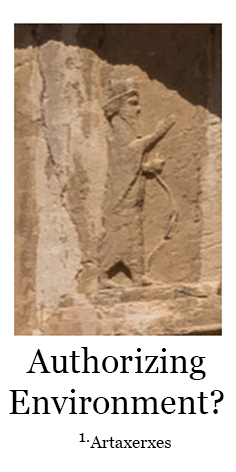If it wasn’t for people . . . leadership beyond the organization wouldn’t be necessary.
So many times, people think of the exercise of leadership with only a focus within an organization. I learned many years ago from Professor Ronald Heifetz of Harvard University that exercising leadership is much more than a focus on those people for whom you the “leader” have a direct responsibility. Leadership involves influencing people and factors not only within the organization, but also external. He breaks this into three components; your organizational goals, your authorizing environment, and your organizational resources, all of which must come close to aligning if the organization is to move forward.
Organizational goals come from your perceived mandate, people internal to your organization, and I would say, that “still small voice.” But if you the “leader,” have neither the authority to move forward nor the resources to fulfill a vision, all will be in vain. That means that you the “leader” must move outside your “defined job description,” and exercise leadership to shape your higher level and collateral environment and find the resources with which to accomplish the mission or execute changes that you the “leader” have found important.
Your authorizing environment may be your direct boss, the corporate VP or CEO, your lead pastor in your church, your military commander, the voters in your city, and yes, even the Congress of the United States. Your challenge becomes one of influencing those outside your realm of direct control to support or authorize those changes that you see, and your organization sees as critical to moving forward to successfully complete your assigned mission or fulfill a vision that has been placed upon your heart. How you “influence” is the heart of leadership particularly in those external venues where you have no direct authority.
Having obtained the authority to go forward does not necessarily mean that it comes with the resources to accomplish the mission or fulfill the vision. The most obvious example in our republican system of government involves the President of the United States and the Congress. The President is elected indirectly by the people (the authorizers) to make change or fulfill a vision. He has that authority to go forward. But the Congress controls the resources, and it is through the Congress that the President must exercise leadership to obtain those resources to fulfill his mandate. This seems like a simple process, and it would be, “If it wasn’t for people” and all the messy complications they bring. This is generally true in any organizational environment, but hopefully not to the degree in which our political system functions.
If this seems all too messy, look to the source of truth on the matter, God’s Word. The example of this situation I like the best is the Book of Nehemiah. Nehemiah was cup bearer to King Artaxerxes of Persia during the second Jewish exile that began in 586 BC. Nehemiah heard that the remnant of Jewish people in Jerusalem were distressed because the wall around the city was in total disrepair. Nehemiah prayed more than he planned, and the King was moved to ask why Nehemiah was of such a sad countenance to which he responded with his concern and vision. Nehemiah through his actions and prayers influenced King Artaxerxes to provide authorization for him to return to Jerusalem and rebuild the wall. The King provided Nehemiah a letter of passage through Trans-Euphrates. The King also gave Nehemiah access to his resources (King’s don’t have a congress) to rebuild the wall such as lumber from the King’s forest. The stage was set for Nehemiah to travel to Jerusalem and organize the rebuilding effort; convince the Jewish remnant to do the work and overcome some entrenched resistance to the project. But the real lesson in this story is that Nehemiah was one of the Lord’s people and he always first sought the Lord’s will, and with that approach, yes, he was bound to succeed. Might that be your approach? Listen to Him first, discover His will, and then obey. It’s a good formula provided you’re willing to submit and that submission might just come from, “I am the way, the truth, and the life . . .” And, read Nehemiah, it is a great story about the exercise of leadership.





